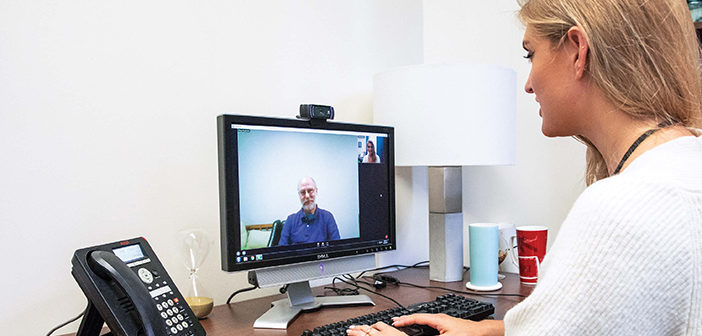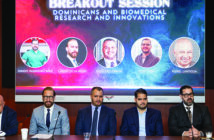Telemedicine builds bridges to better mental health for the state’s most isolated residents.
Block Island’s remoteness, so appealing to tourists getting away from it all, can be a major hardship for year-round residents struggling with mental illness and needing care.
Patrick Tengwall, 63, and his wife, a Block Island native, moved there from East Providence in 2007. But with no full-time mental health professionals on the island, Tengwall had no choice but to travel to Barrington to continue to see his psychiatrist. Each appointment entailed a ferry ride, a car rental, and a drive across the state, every month, to get his medications refilled.
“It is a day out of your life. It is money out of pocket,” he says. “This is what anybody needing most medical specialties needed to do to get care.”
Tengwall acknowledges he was fortunate to have the time and money to take a whole day to see his doctor, but many islanders don’t. Furthermore, the ordeal adds stress for someone already dealing with anxiety or other mental health issues.
In 2010, that inconvenience became a crisis when Block Island resident Ross Campbell committed suicide. He was 48 years old.
“This island failed him. And I think we all have to accept some responsibility for not dealing with that,” says Jim Hinthorn, president of the Block Island affiliate of the National Alliance on Mental Illness (NAMI-BI). “I’m not sure we could have prevented his suicide. But we could have done more.”
The tragedy spurred concerned citizens to action. They formed the Block Island Mental Health Task Force (which later became NAMI-BI). Led by Steve Hollaway, then the minister of the Harbor Baptist Church, they began advocating for more services, including regular visits by practitioners from the mainland.
The group found a ready partner in Butler Hospital, where the Brown psychiatry residency program jumped at the chance to help fill a need, while training new doctors to practice psychiatry in a new way: telehealth.
“It hit a lot of the things we wanted our residency to stand for, which is service to the community and advancement and always looking forward,” says Tracey Guthrie, MD, the residency program director and an associate professor of psychiatry and human behavior at Brown.
Telehealth, or telemedicine, refers broadly to an array of technologies that deliver health care virtually. The Block Island telepsychiatry service, which launched eight years ago, is a secure, two-way video link that connects a doctor at Butler with patients on the island.
“I’ve been a patient of the program from its beginning,” Tengwall says. “I was thrilled.” Compared to in-person appointments, “it’s not that much different. The picture is a little grainier than seeing a person live. Sometimes, there are glitches with the internet. …
“But the relationship you develop with the doctor, I’d say, is more important than the medium by which you’re talking to the doctor.”
Virtually the Same
For the first few years, telepsych appointments were held in a room at the Harbor Baptist Church, before moving to the Block Island Medical Center. In a tiny community where everyone knows everyone’s vehicle, “there could be a million reasons why people are going to the church,” says Guthrie, who has been supervising the telepsych service for four years. “Once people got comfortable, they realized that you could be going into the medicine clinic for any reason whatsoever.”
The telepsychiatry room is cozy, with comfortable chairs and a couch. “It is like being in a counselor’s office,” Tengwall says. One major difference, of course, is the large computer monitor with two-way cameras. The other is the presence of the case manager, Tracy Fredericks.
Fredericks has been facilitating the program from the island since its inception. She’s there to connect the patient and the doctor, fix technical issues, schedule appointments, and fill out paperwork. Also, “I’m part of the [patient’s] support group,” she says. “It’s to build a sense of trust: if there’s ever anything that comes up, they know that they can contact me.”
Caitlin Meyer, MD, the psychiatry resident whom Block Island patients saw last year (a different resident rotates through the clinic each year), says it’s not unusual to have a team of people caring for one patient. “Certainly, it’s a bit different from some of my other outpatient appointments,” Meyer says. “In this case, I think it really enhances our care because we have someone who is physically present.”
Fredericks has lived on Block Island for 14 years and knows just about everyone in the program. “There’s only been one time where a client has asked if I could leave the room for just a couple of seconds,” she says. However, “I think most of the clients like that I am there. They know I’m on the island and they know they can call me whenever.” She does wonder, though, if anyone hasn’t engaged the service because they know her personally.
“I have to choose not to share certain things in the teleconference because [I’d] rather that Tracy not know,” Tengwall says. Instead he saves those issues for other counselors when they hold appointments on the island. But privacy is always a concern. Everyone knows the telepsych clinic takes place Wednesdays. “There’s the possibility that, if you park your car there at a certain time of the day or week, [other people]will figure out that you are there for a psychiatric teleconference,” he says. “You live with that. You kind of have to.”
Reducing stigma around mental health is one of the three main goals of NAMI-BI, Hinthorn says, along with bringing more services to the island and providing support for families. Each year the group presents the Ross Campbell Memorial Award to a local mental health advocate. Since Campbell died, “We’re doing, I think, a better job,” Hinthorn says. “There’s a lot of work to be done. … Our job is to just move the ball forward.”
‘Stuck on the Rock’
Since its inception the telepsychiatry service has treated only adults. That means psychiatry patients younger than 18 still have to miss a day of school to see their doctors. But that is about to change.
Last year Jeffrey Hunt, MD, the director of Brown’s Child and Adolescent Psychiatry Fellowship Program, at Bradley Hospital, joined Guthrie and NAMI-BI representatives to figure out how to duplicate the adult program for younger patients.
“There was a lot of unmet need,” Hunt says. He estimates that of the roughly 130 K-12 students at Block Island School, up to 30 may have mental health issues, including anxiety, depression, and ADHD.
Hunt has treated some adolescents who have traveled from the island to Bradley. “What I heard from those kids is that sense of isolation,” he says. One teen told Hunt they were “stuck on ‘the Rock.’” Social media can exacerbate the feeling that they’re left out. “Especially in the winter, when the ferry boats are running less and it’s cold and gray,” he adds, “that doesn’t help whatever disorder you’re struggling with.”
When the adolescent telepsych service is up and running, it will be easy for students to access during the school day; the Block Island Medical Center is literally next door. Meanwhile they can see a clinical psychologist who comes to the school two days each month and can speak to patients by phone or Skype at other times. Hunt says Bradley’s Pediatric Psychiatry Resource Network is also available to help primary care doctors throughout Rhode Island manage patients, and it sends a case manager to the island periodically to collaborate with the local providers.
As with the adult program, a child and adolescent psychiatry trainee will conduct the telepsychiatry sessions, from their office at Bradley. Hunt eventually wants everyone trained in telehealth. “Wherever people go in the country, it’s going to be more and more available and required that they know how to do it,” he says.
The adolescent service will launch as soon as a secure video channel is established (Bradley, a Lifespan hospital, uses different technology than Butler, which is Care New England). Everyone involved hopes that will happen this fall, including Meyer, who finished her residency and is now a fellow in Hunt’s program. “Telemedicine is really the future of psychiatry,” she says. “I would love to continue my work.”
The Future of House Calls
Telehealth can improve access to care in the most isolated places—an obvious need in huge, sparsely populated Western states, but even in Little Rhody not everyone can get to the doctor easily.
“Transportation is an issue here,” Guthrie says. “Everyone thinks everyone has access to a vehicle, and they don’t.” With most of the state’s mental health professionals concentrated in the Providence area, even mainland residents who have cars may need to allot half a day for a half-hour appointment.
Furthermore there’s a shortage of psychiatrists nationwide, particularly those who treat kids. “Communities have developed workarounds. Most of the time, it’s the primary care docs who have had to figure out how to manage them,” Hunt says. But “it’s not an area of comfort for a pediatrician to manage somebody with bipolar disorder or suicidal behavior.” With telehealth, one specialist can see more patients in more places without having to leave their office. “It’s a way more efficient way of treating people,” Hunt says.
As technology improves, advocates hope to continue to expand telehealth services on Block Island. Right now, psychiatry appointments mostly concern medication management. “The talk therapy of it really doesn’t happen,” Hinthorn says. “That, from my perspective, is the next frontier for us: if we can bring telecounseling services to the island.”
Even the island’s existing technology could be augmented. “Some of the systems in other parts of the country have the capacity for zooming into facial expressions, and then they have a computer screen on a robot,” Hunt says.
Such technology is already in use here. The Providence VA Medical Center has a transportable exam cart to see patients on Martha’s Vineyard and Nantucket. “It’s a little 3-by-3 aluminum case,” says Allen Andersen, BSN, BA, RN, the director of Telehealth Services at the Providence VA. “We can do basically a full exam remotely. It has an ENT scope on it, it has a stethoscope on it, and two different cameras. We have a stationary camera on top that can zoom in, and then we have a handheld wand that we can zoom in wherever we need to.”
The VA offers telehealth services in primary care and mental health care as well as cardiology, neurology, podiatry, physical therapy, wound care, and more. Though most telehealth appointments take place in a satellite clinic, as on Block Island, with a nurse or other practitioner present with the patient, the VA also gives iPads and other devices to patients with chronic conditions to monitor their blood sugar, EKG, blood pressure, and other health parameters at home.
Starting this year, Andersen says, VA primary care and mental health providers will begin holding video appointments with patients in their homes. “When I was a kid, the doctors used to make house calls,” he says. “So it’s kind of like getting back to that.”
The Providence VA has been practicing medicine remotely for nearly three decades, since it began offering couriered dermatology consultations for patients in Maine. Though slow, it cut critical waiting time for patients. “I don’t know how many lives we saved, but I’m sure we saved quite a few since we’ve been doing this,” Andersen says.
A psychiatric nurse by trade, Andersen is emphatic that Block Island telepsychiatry serves a vital need. “The more access you can get for the public in general,” he says, “the better things can be.”




